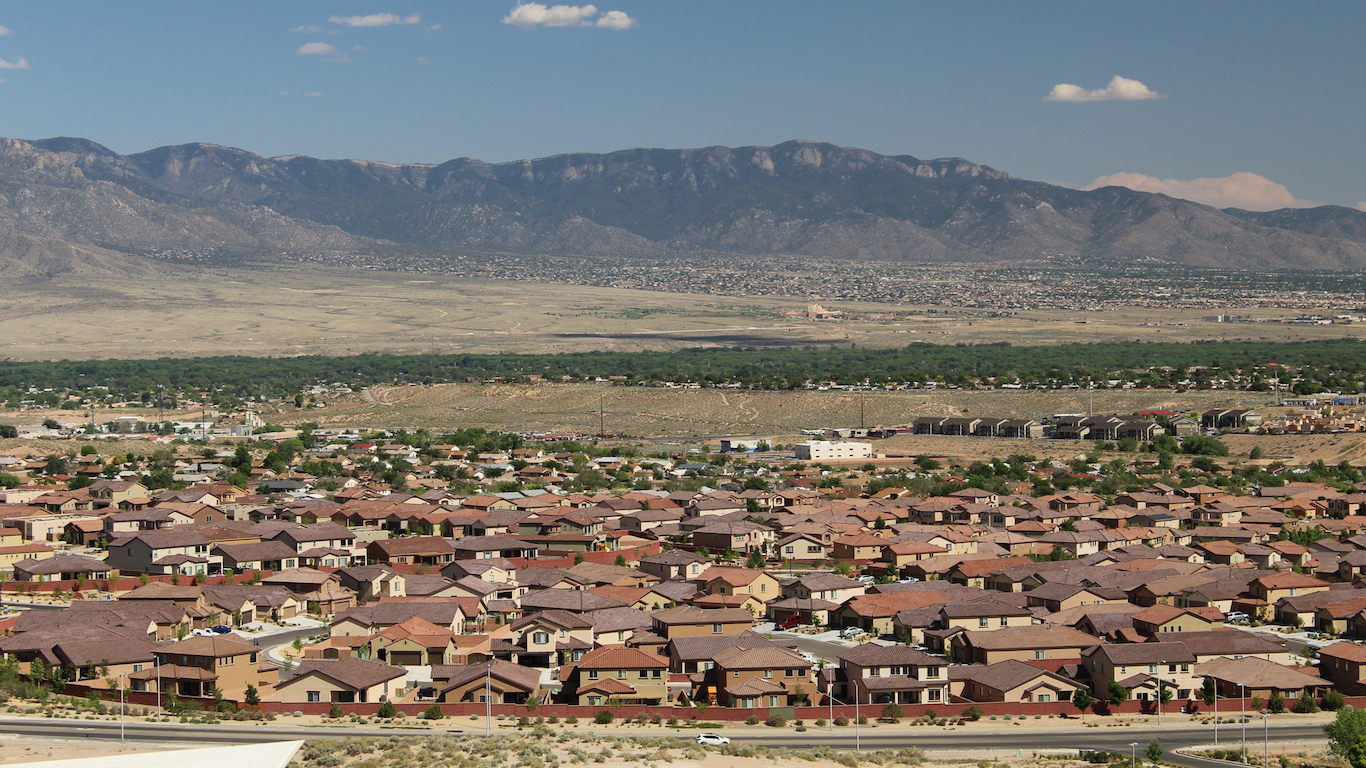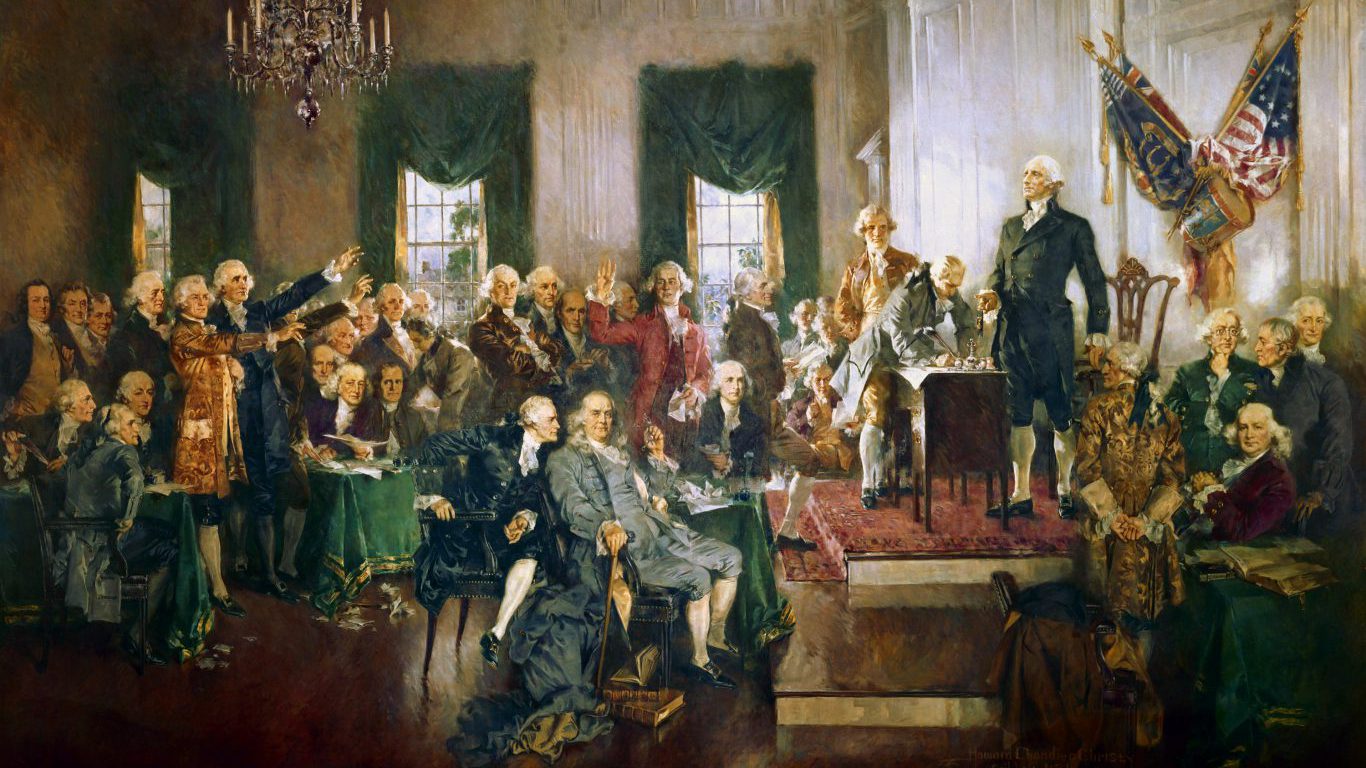Since the United States of America declared its independence from the British Empire, every state has carved out its own individual identity, with a different cultural mix and a variety of languages spoken. From the 13 original colonies to 50 different states, each part of the country has had a unique journey to become one of the stars on the American flag.
From Delaware in 1787 to Hawaii in 1959, each state has had different reasons for wanting to join the Union, or the U.S. has had different reasons for wanting to bring the state into the fold. During the 19th century, Americans felt it was their “Manifest Destiny” to expand the nation across the entire continent. The U.S. added 14 new states from 1812 to 1850, bringing the total to 31 states and signaling a new era in American history.
In order to determine how each state was founded, 24/7 Wall St. reviewed state historical records and media reports to find each state’s founding date, its early representatives, capital city, status before statehood, and background information about the circumstances leading to statehood. The first capital of a state is the first city to be designated the capital once the state was admitted to the U.S. or the first place where the state’s legislature convened. Data on each state’s first governor came from the National Governors Association.
Some states, like California, had an easy time getting into the Union, mostly because of economic reasons. After the discovery of gold, the most important historical event in California, the Golden State was fast-tracked into the U.S. in 1850. Other states, like Utah, were kept as territories for decades before finally being admitted into the Union. Here is the most important historical event in every state.
The first 13 states started as British colonies, but later fought for and won their independence. Most of America’s towns founded before the Revolution are found in these states. Each state officially joined the United States once it ratified the Constitution. Delaware became the first state when its representatives approved the Constitution on Dec. 7, 1787. Here are 102 U.S. towns founded before the American Revolution.
In a handful of cases, new states formed by separating from an existing state. Kentucky left Virginia after feeling dissatisfied with its government. West Virginia residents generally disliked the idea of secession, so the state split from the recently seceded Virginia during the Civil War. And Maine was separated from Massachusetts to maintain the balance of slave states and free states when Missouri joined the Union.
As the U.S. continued to acquire land, either through purchase or force, more territories were added. The U.S. bought 530 million acres from France in the Louisiana Purchase. The U.S. also completed its desire to go from sea to shining sea after defeating Mexico in the Mexican-American War in 1848, acquiring the land that would become California, Texas, and several other Southwestern states.
The U.S. hasn’t added another star to its flag in over 50 years, but that doesn’t mean it is done adding states. Puerto Rico, one of five U.S. territories along with American Samoa, Guam, the Northern Mariana Islands, and the U.S. Virgin Islands, is pushing for U.S. statehood.

1. Alabama
> Founding date: December 14, 1819 (22nd state to join)
> First capital city: Cahaba
> First governor: William Wyatt Bibb
After Southerners pressured Congress to add more slave states, the Alabama Territory was carved out of the Mississippi Territory in 1817. Alabama was admitted as a state two years later.

2. Alaska
> Founding date: January 3, 1959 (49th state to join)
> First capital city: Juneau
> First governor: William Allen Egan
More than 90 years after being purchased from Russia, Alaska was admitted as the 49th state, just ahead of Hawaii.

3. Arizona
> Founding date: February 14, 1912 (48th state to join)
> First capital city: Phoenix
> First governor: George Wylie Hunt
Arizona first became an officially recognized territory of the Confederacy in 1862, but the Union claimed it as well nearly a year later. Despite petitions from Arizona Territory residents, it didn’t become a state for decades.

4. Arkansas
> Founding date: June 15, 1836 (25th state to join)
> First capital city: Little Rock
> First governor: James Sevier Conway
Arkansas was first acquired from France in 1803 as part of the Louisiana Purchase. The state we know today split off from the Missouri Territory when it applied to become a state in 1819. It spent years as its own territory before achieving statehood.

5. California
> Founding date: September 9, 1850 (31st state to join)
> First capital city: San Jose
> First governor: Peter Hardeman Burnett
After winning the Mexican-American War, the U.S. took over California as well as the land that would become Texas and the Southwest. Shortly before the treaty ending the war was signed, gold was discovered in California. That economic incentive, plus the growing divide in the U.S. over slavery, pushed Congress to admit California as a free state in 1850, bypassing any time spent as a territory.

6. Colorado
> Founding date: August 1, 1876 (38th state to join)
> First capital city: Denver
> First governor: John Long Routt
Colorado was part of Mexico in 1848, then part of the Territory of Kansas, then part of an unorganized territory. It became its own territory just before the Civil War began in 1861. Colorado would have to wait fifteen years as a territory before it became a state.

7. Connecticut
> Founding date: January 9, 1788 (5th state to join)
> First capital city: Hartford
> First governor: Samuel Huntington
Connecticut is sometimes known as the Constitution State because it is home to the Fundamental Orders of Connecticut, the first constitution written in the U.S., adopted in 1639. However, the state was the fifth colonial government to approve the Constitution, so it became the fifth state to join the United States.

8. Delaware
> Founding date: December 7, 1787 (1st state to join)
> First capital city: Dover
> First governor: Thomas Collins
Delaware’s representatives were the first to ratify the new U.S. Constitution in 1787, less than a week before Pennsylvania, making it the first state. Delaware’s status as the first state is a major point of pride for its residents. The date Delaware ratified the Constitution, Dec. 7, 1787, is on the state flag.

9. Florida
> Founding date: March 3, 1845 (27th state to join)
> First capital city: Tallahassee
> First governor: William Dunn Moseley
In America’s early years after winning its independence from England, Spain was having difficulty controlling its territory of Florida. After many border disputes between Spain and the U.S., Secretary of State John Quincy Adams purchased the area in 1819 for $5 million.

10. Georgia
> Founding date: January 2, 1788 (4th state to join)
> First capital city: Augusta
> First governor: George Mathews
Georgia was the last of the 13 original colonies to be established after it was settled by James Oglethorpe in 1732, but it was one of the first states to ratify the new Constitution. Georgia’s delegates ratified the Constitution on Jan. 2, 1788, making it the fourth state.

11. Hawaii
> Founding date: August 21, 1959 (50th state to join)
> First capital city: Honolulu
> First governor: William Francis Quinn
For much of American history, Hawaii was a kingdom. All of its islands were brought together by King Kamehameha in 1810. In the late 19th century, the monarchy was overthrown by the increasingly large number of white businessmen. With the monarchy out of power, the U.S. annexed the island in 1898. Hawaii remained a territory for over 60 years before it was granted statehood.

12. Idaho
> Founding date: July 3, 1890 (43rd state to join)
> First capital city: Boise
> First governor: George Laird Shoup
Idaho was the last of the 50 states to be explored and one of the last admitted to the Union. Lewis and Clark made it to the state in 1805, but Idaho was largely forgotten until 1860, when gold was discovered. The Idaho Territory was established in 1863, and Idaho was admitted as a state in 1890.

13. Illinois
> Founding date: December 3, 1818 (21st state to join)
> First capital city: Kaskaskia
> First governor: Shadrack Bond
From 1816 to 1821, the U.S. added one new state each year. These new states were tenuously balanced: three were admitted as slave states and three as free states. Illinois joined the Union as a free state in 1818, a year before Alabama and a year after Mississippi, both slave states.

14. Indiana
> Founding date: December 11, 1816 (19th state to join)
> First capital city: Corydon
> First governor: Jonathan Jennings
The land that is now known as Indiana was previously called the Northwest Territory starting in 1787. In 1800, the Indiana Territory was split from that land. Sixteen years later, Indiana was admitted as the 19th state.

15. Iowa
> Founding date: December 28, 1846 (29th state to join)
> First capital city: Iowa City
> First governor: Ansel Briggs
Originally part of the Louisiana Purchase, Iowa grew in population thanks to its reputation for good farmland. Iowa was first established as a territory in 1838. By 1860 its population was more than 25 times higher. It became a state in 1846 later as a way to maintain the balance between slave and free states.

16. Kansas
> Founding date: January 29, 1861 (34th state to join)
> First capital city: Topeka
> First governor: Charles Lawrence Robinson
The Kansas-Nebraska Act of 1854, allowed Kansas residents to determine whether or not the state would allow slavery.This legislation led to violence between abolitionists and anti-abolitionists known as “Bleeding Kansas.”

17. Kentucky
> Founding date: June 1, 1792 (15th state to join)
> First capital city: Lexington
> First governor: Isaac Shelby
Kentucky became the first state west of the Appalachian Mountains and the second state that wasn’t one of the 13 original colonies in 1792. The state started as part of Virginia, but its residents grew upset with Virginia’s government for failing to protect them from Native Americans. Those residents petitioned for independence and received statehood in 1792.

18. Louisiana
> Founding date: April 30, 1812 (18th state to join)
> First capital city: New Orleans
> First governor: William Charles Cole Claiborne
Louisiana’s statehood marked a new chapter for U.S. expansion. It was America’s first state outside of the borders agreed upon in the Treaty of Paris in 1783. The area, bought from France in 1803’s Louisiana Purchase, was regarded as different from the rest of the country. It was known for gambling, drinking, and a large Catholic population, practices not often seen in the rest of the Union.

19. Maine
> Founding date: March 15, 1820 (23rd state to join)
> First capital city: Portland
> First governor: William King
Maine was crucial in keeping the balance between slave states and free states in the antebellum period. Maine separated from Massachusetts to offset the addition of Missouri to the Union. Maine had no slavery while Missouri did.

20. Maryland
> Founding date: April 28, 1788 (7th state to join)
> First capital city: Annapolis
> First governor: John Eager Howard
When Maryland ratified the U.S. Constitution in April 1788 it signaled a turning point for the U.S. as a new country. The first six colonies to become states did so quickly, in a matter of a few months. Representatives from the other seven colonies had some reservations about signing, but Maryland pushed through those and became the seventh state, meaning more than half of the colonies had signed.

21. Massachusetts
> Founding date: February 6, 1788 (6th state to join)
> First capital city: Boston
> First governor: John Hancock
Massachusetts, which contains numerous historical sites and landmarks from America’s revolutionary period, ratified the Constitution in February, 1788, just two months after Delaware became the first state to do so. Some Massachusetts representatives were unsure about signing the document until a Bill of Rights was proposed.

22. Michigan
> Founding date: January 26, 1837 (26th state to join)
> First capital city: Detroit
> First governor: Stevens Thomson Mason
Michigan had to make some sacrifices in order to become a state. Its bid for statehood was blocked because of a border dispute with Ohio known as the “Toledo War.” To resolve the dispute, Michigan had to give up the land around what is now Toledo, Ohio. Michigan got some land back when President Andrew Jackson added the Upper Peninsula region to the state’s borders in the bill granting it statehood.

23. Minnesota
> Founding date: May 11, 1858 (32nd state to join)
> First capital city: St. Paul
> First governor: Henry Hastings Sibley
Minnesota became a state on May 11, 1858, but the state was so isolated at the time that it took over a week for state residents to find out. Minnesota, a free state, was supposed to join the Union with Kansas to preserve the balance of free and slave states, but Kansas’ admission was delayed because of voter fraud.

24. Mississippi
> Founding date: December 10, 1817 (20th state to join)
> First capital city: Natchez
> First governor: David Holmes
The area that became Mississippi was under Spanish control after the United States was first founded. Spain eventually ceded the area in 1798, leading to the creation of the Mississippi Territory. Mississippi was later split in two, creating Alabama, just before it became a state.

25. Missouri
> Founding date: August 10, 1821 (24th state to join)
> First capital city: St. Charles
> First governor: Alexander McNair
In the early 19th century, settlers began to push out farther west, and Congress wanted to ensure that there was still a balance to tamp down the tension between slave states and free states. Missouri, a slave-owning territory, pushed for statehood and received it with the Missouri Compromise, meaning that it got statehood, but only because Maine split off from Massachusetts as a free state.

26. Montana
> Founding date: November 8, 1889 (41st state to join)
> First capital city: Helena
> First governor: Joseph Kemp Toole
Montana became a U.S. territory after the discovery of gold in the area. Railroads were constructed in the state during the 1880s, linking it with the rest of the country. It was admitted as a state in 1889.

27. Nebraska
> Founding date: March 1, 1867 (37th state to join)
> First capital city: Omaha
> First governor: David Butler
The first state to join the Union after the Civil War, Nebraska became the 37th state in 1867. Nebraska was supposed to gain statehood over a decade earlier, but partisan fighting over slavery delayed its admission.

28. Nevada
> Founding date: October 31, 1864 (36th state to join)
> First capital city: Carson City
> First governor: Henry Goode Blasdel
Nevada joined the U.S. as the 36th state in 1864, though at that time many of those states were in open revolt as the Civil War raged. Even though Nevada was sparsely populated at the time, it was strongly Republican and pro-Union, so President Abraham Lincoln passed over other territories and made Nevada a state to bolster his political support.

29. New Hampshire
> Founding date: June 21, 1788 (9th state to join)
> First capital city: Exeter
> First governor: John Langdon
New Hampshire was one of the original 13 colonies to ratify the Constitution, but its vote may have been the most important. New Hampshire cast the decisive ninth vote, meaning the Constitution was now supported by a two-thirds majority of colonies and the idea of the United States was now a reality.

30. New Jersey
> Founding date: December 18, 1787 (3rd state to join)
> First capital city: Trenton
> First governor: William Livingston
After ratifying the Constitution in late 1787, New Jersey became the third state, just behind Delaware and Pennsylvania. New Jersey’s representatives agreed to join the U.S. with a unanimous 38-0 vote.

31. New Mexico
> Founding date: January 6, 1912 (47th state to join)
> First capital city: Santa Fe
> First governor: William Calhoun McDonald
New Mexico was one of just five states added to the Union in the 20th century, and the penultimate member of the lower 48 states. The area that became New Mexico was ceded by Mexico after the Mexican-American War. Many people moved to the area after the Santa Fe Railroad opened in 1879. New Mexicans voted to become a joint state with Arizona in 1906, but Arizona voters rejected the proposal.

32. New York
> Founding date: July 26, 1788 (11th state to join)
> First capital city: Kingston
> First governor: George Clinton
Because its representatives had some misgivings about ratifying the Constitution, New York was one of the last colonies to become a state. New York Governor George Clinton wrote anonymous critiques of the document in newspaper columns. However, New York’s representatives narrowly agreed to join the U.S. with a 30-27 vote.

33. North Carolina
> Founding date: November 21, 1789 (12th state to join)
> First capital city: New Bern
> First governor: Alexander Martin
North Carolina was one of the final holdouts against ratifying the U.S. Constitution. Eleven states had already agreed to form a new nation, but North Carolina remained unconvinced until the Bill of Rights was proposed.

34. North Dakota
> Founding date: November 2, 1889 (39th state to join)
> First capital city: Bismarck
> First governor: John Miller
North Dakota’s statehood came about largely as a result of railroads. The Northern Pacific Railway, built in 1872, allowed people to move to places like Fargo and Bismarck, leading to a population boom in the area.

35. Ohio
> Founding date: March 1, 1803 (17th state to join)
> First capital city: Chillicothe
> First governor: Edward Tiffin
Ohio’s statehood was a hard-fought partisan issue in Congress in the early 1800s between the Democratic-Republican Party and the Federalist Party. The Federalists thought they could control what was then the Northwest Territory if it remained a territory, while their opponents thought Ohio becoming a state would work in their favor. President Thomas Jefferson, a Democratic-Republican, signed a bill to help his party members in 1802, and Ohio became a state shortly after.

36. Oklahoma
> Founding date: November 16, 1907 (46th state to join)
> First capital city: Guthrie
> First governor: Charles Nathaniel Haskell
Oklahoma quickly gained statehood after the Land Run of 1889. Many people lined up on the border of what was known as the Unassigned Lands to get their own real estate. After they had settled, they demanded representation and statehood, getting their wish in 1907.

37. Oregon
> Founding date: February 14, 1859 (33rd state to join)
> First capital city: Salem
> First governor: John Whiteaker
The Oregon Territory was created in 1848 shortly after a treaty between the U.S. and Great Britain established a border for the U.S. When Americans later moved to the area, they wanted to be able to govern themselves, demanding statehood.

38. Pennsylvania
> Founding date: December 12, 1787 (2nd state to join)
> First capital city: Philadelphia
> First governor: Benjamin Franklin
Pennsylvania just narrowly missed out on becoming the first state to join the U.S., ratifying the new constitution just five days after Delaware, in Dec. 12, 1787. Pennsylvania aimed to be the first to ratify the Constitution in the hopes of having the national capital in the state.

39. Rhode Island
> Founding date: May 29, 1790 (13th state to join)
> First capital city: Providence
> First governor: Arthur Fenner
Rhode Island was the final holdout of the 13 colonies in signing the new Constitution. The state waited nearly two and a half years longer than the first states to approve the document. Even then, Rhode Island’s representatives only approved the Constitution narrowly — and that may be because it was threatened with being treated as a hostile foreign power if it didn’t comply.

40. South Carolina
> Founding date: May 23, 1788 (8th state to join)
> First capital city: Charleston
> First governor: Charles Pinckney
South Carolina split from North Carolina in 1712 and then beat its northern neighbor to statehood by approving the Constitution over a year earlier. South Carolina became the eighth state in May 1788.

41. South Dakota
> Founding date: November 2, 1889 (40th state to join)
> First capital city: Pierre
> First governor: Arthur Calvin Mellette
South Dakota was the 40th state to join the U.S., though it easily could have been 39th. Both North Dakota and South Dakota were incorporated on the same day, Nov. 2, 1889. But President Benjamin Harrison didn’t want to favor one over the other, so he shuffled the bills for the two new states, and North Dakota just happened to be signed first.

42. Tennessee
> Founding date: June 1, 1796 (16th state to join)
> First capital city: Knoxville
> First governor: John Sevier
Tennessee was part of North Carolina for more than a decade after the colonies declared their independence. After North Carolina ratified the Constitution, it gave the lands that became Tennessee to the federal government, which named them the Southwest Territory. After years of fighting with Native Americans, Tennesseans felt they weren’t being adequately protected by the federal government and demanded statehood. They received it in 1796.

43. Texas
> Founding date: December 29, 1845 (28th state to join)
> First capital city: Austin
> First governor: James Pinckney Henderson
After winning its independence from Mexico in 1836, Texas spent nine years as an independent republic. Many Texans still celebrate March 2 as Texas Independence Day. Many Texans also were in favor of joining the Union, and the U.S. annexed Texas in 1845.

44. Utah
> Founding date: January 4, 1896 (45th state to join)
> First capital city: Salt Lake City
> First governor: Heber Manning Wells
The area that became Utah joined the U.S. after the Mexican-American War in 1848. Many in the area wanted statehood so they could elect their own Mormon leadership. However, the rest of the country balked at the idea after the Mormon church revealed that some of its members practiced polygamy. It wasn’t until Utah banned polygamy in its state constitution that it was admitted to the Union in 1896.

45. Vermont
> Founding date: March 4, 1791 (14th state to join)
> First capital city: Various
> First governor: Thomas Chittenden
Vermont became its own independent state during the Revolutionary War. Once it decided it wanted to become a state, Vermont had to pay New York $30,000 to settle a territorial dispute before it could be admitted. Vermont was the first state that wasn’t one of the 13 original colonies. Vermont legislators met in several different cities after joining the Union before finally settling on Montpelier as a permanent capital.

46. Virginia
> Founding date: June 25, 1788 (10th state to join)
> First capital city: Richmond
> First governor: Beverley Randolph
As one of the most populated and richest colonies, Virginia held a lot of sway over the other 12. Virginia residents, including Patrick Henry and James Monroe, opposed adopting the U.S. Constitution. But the addition of a Bill of Rights may have convinced Virginia’s representatives into becoming the 10th state to ratify the Constitution.

47. Washington
> Founding date: November 11, 1889 (42nd state to join)
> First capital city: Olympia
> First governor: Elisha Peyre Ferry
Washington was the last of four states — after North Dakota, South Dakota, and Montana — to be admitted into the Union in November 1889. This rush of new states came on the heels of an act from Congress permitting territories to become states as long as they had adopted a state constitution.

48. West Virginia
> Founding date: June 20, 1863 (35th state to join)
> First capital city: Wheeling
> First governor: Arthur Ingraham Boreman
West Virginia was founded by splitting from Virginia during the Civil War. The western part of Virginia was decidedly pro-Union, while the rest of Virginia wanted to secede. Though President Abraham Lincoln was uneasy about whether the split was constitutional, he declared West Virginia the 35th state.

49. Wisconsin
> Founding date: May 29, 1848 (30th state to join)
> First capital city: Madison
> First governor: Nelson Dewey
For many years, people in the Wisconsin Territory were opposed to statehood. They were concerned that becoming a state would lead to higher taxes and they rejected statehood four times. Eventually, the residents relented and voted for statehood in 1848.

50. Wyoming
> Founding date: July 10, 1890 (44th state to join)
> First capital city: Cheyenne
> First governor: Francis E. Warren
Wyoming is the least populous state in the U.S. It was also sparsely populated in 1889, which posed an issue for the area. The Wyoming Territory wanted to become a state, but it was 5,000 people short of the 60,000-person requirement set forth by the Northwest Ordinance to become a state. Nonetheless, Congress and President Benjamin Harrison admitted Wyoming to the Union.
